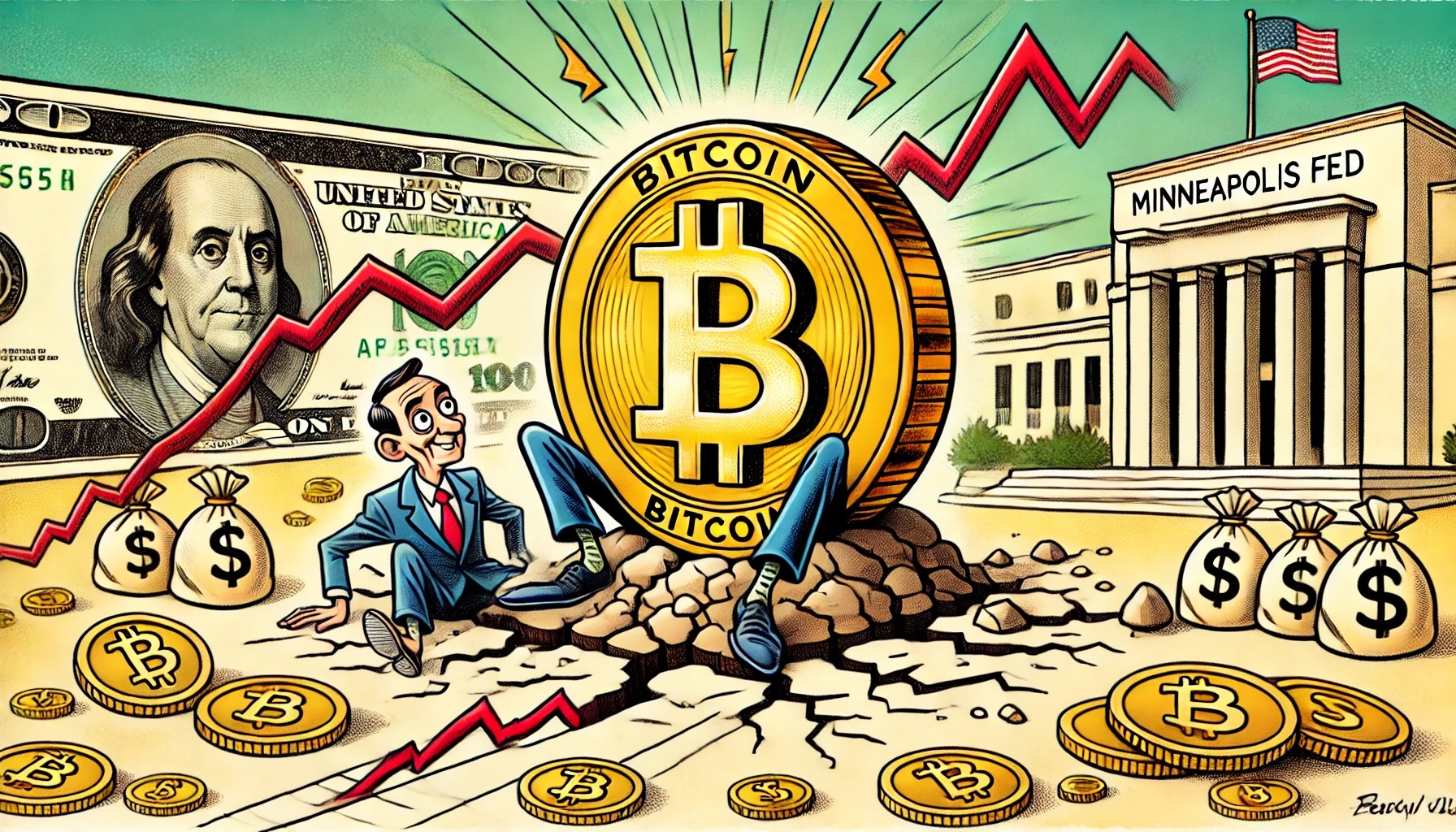During a recent public address, Minneapolis Federal Reserve President Neel Kashkari dismissed Bitcoin as a speculative asset and questioned its viability as an inflation hedge. Kashkari claimed he has never met anyone who used Bitcoin for everyday purchases, challenging its role in the financial system.
Neel Kashkari Criticizes Bitcoin, Calling It a Speculative Asset and Questioning Its Inflation Hedge Viability
During a recent public address, Minneapolis Federal Reserve President Neel Kashkari launched a vitriolic attack on the foundational principles of the digital currency Bitcoin, with a particular focus on the cryptocurrency sector. Nevertheless, considering that the U.S. dollar has lost approximately 90% of its value in Bitcoin over the past five years, it may be prudent for advocates of the current monetary system to exercise caution and humility.
The three primary points that Kashkari uses to argue against Bitcoin are as follows. Initially, he raises concerns regarding the feasibility of Bitcoin as a medium of exchange, citing that he has never encountered an individual who has used the cryptocurrency to purchase commonplace items. Additionally, he pointed to Bitcoin's steep decline during the inflationary surge after the pandemic, contending that this underscores its inadequacy as an inflation hedge. Finally, Kashkari characterizes Bitcoin as merely a speculative asset.
Kashkari's ‘Infinite Cash’ Comment Highlights Fiat Currency Limits, While Bitcoin Gains as a Hedge Against Monetary Debasement
In an ironic twist, Kashkari has also been recorded as claiming that the Federal Reserve possesses an "infinite amount of cash." Although the implications of such liquidity creation are beyond the scope of this discussion, a brief comparison of the purchasing power of an ounce of gold in 1971 and today underscores the constraints of fiat currency systems.
Bitcoin is a relatively young financial instrument still in its developmental period and subject to volatility. However, there is a growing consensus that it is an exceptional hedge in risk-on environments. Recent research corroborates this hypothesis, indicating that Bitcoin exhibits an 83 percent correlation with the global M2 money supply, a correlation unparalleled by other significant assets.
According to Wccftech, this dynamic implies that Kashkari and his colleagues' monetary policies, particularly those contributing to monetary debasement, have inadvertently fueled Bitcoin's price surge. Bitcoin's function is not limited to a mere inflation hedge; it also functions as a safeguard against the devaluation of fiat currencies, offering a more comprehensive level of protection for investment portfolios and net worth.
China’s 6 Trillion Yuan Stimulus Could Boost Bitcoin, Says Goldman Sachs, Amid Rising Global Liquidity
Furthermore, the recent upward trends in global liquidity indicators suggest that Bitcoin's future will likely be favorable. It is anticipated that China's anticipated substantial stimulus program, which is estimated to be 6 trillion yuan, will address its property market challenges and increase domestic demand. Goldman Sachs expects that the intensity of this stimulus will surpass that of China's M2 money supply, thereby enhancing liquidity and potentially augmenting Bitcoin's performance.
To provide context, M1 encompasses currency in circulation and checkable bank deposits, whereas M2 includes M1 plus savings deposits and money market mutual funds. In essence, Goldman Sachs anticipates that China's currency in circulation must surpass the nation's deposits to prevent deflation, which could encourage Bitcoin supporters.



 Nintendo Share Sale: MUFG and Bank of Kyoto to Sell Stakes in Strategic Unwinding
Nintendo Share Sale: MUFG and Bank of Kyoto to Sell Stakes in Strategic Unwinding  OpenAI Hires Former Meta and Apple AI Leader Ruomin Pang Amid Intensifying AI Talent War
OpenAI Hires Former Meta and Apple AI Leader Ruomin Pang Amid Intensifying AI Talent War  Bitcoin Stuck in $66K–$67K Cage – Break $70K and $78K+ Becomes the Prize
Bitcoin Stuck in $66K–$67K Cage – Break $70K and $78K+ Becomes the Prize  xAI’s Grok Secures Pentagon Deal for Classified Military AI Systems Amid Anthropic Dispute
xAI’s Grok Secures Pentagon Deal for Classified Military AI Systems Amid Anthropic Dispute  Meta Signs Multi-Billion Dollar AI Chip Deal With Google to Power Next-Gen AI Models
Meta Signs Multi-Billion Dollar AI Chip Deal With Google to Power Next-Gen AI Models  FxWirePro- Major Crypto levels and bias summary
FxWirePro- Major Crypto levels and bias summary  Samsung Stock Hits Record High on Nvidia HBM4 Supply Deal, Boosting AI Chip Rally
Samsung Stock Hits Record High on Nvidia HBM4 Supply Deal, Boosting AI Chip Rally  FxWirePro- Major Crypto levels and bias summary
FxWirePro- Major Crypto levels and bias summary  Coupang Reports Q4 Loss After Data Breach, Revenue Misses Estimates
Coupang Reports Q4 Loss After Data Breach, Revenue Misses Estimates  ETHUSD Weakens Further: $1,825 CMP, All EMAs Red, Sell Rallies @ $1,948–50
ETHUSD Weakens Further: $1,825 CMP, All EMAs Red, Sell Rallies @ $1,948–50  ETH Follows BTC Higher: $2056 and Climbing – Bulls Locked In Above $2000
ETH Follows BTC Higher: $2056 and Climbing – Bulls Locked In Above $2000 































